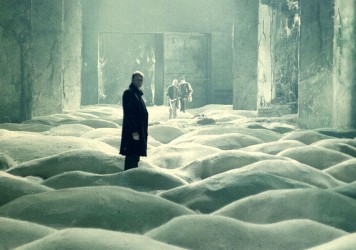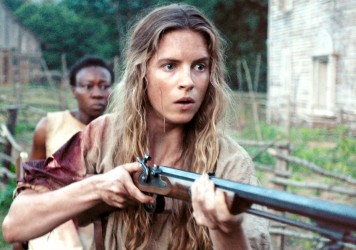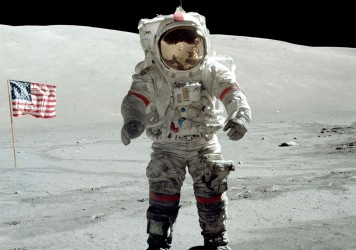Another Earth is original, intelligent and eccentric – a true American indie that deserves to be admired and supported.
Mike Cahill’s Another Earth offers a fractured reflection of what might have been. Not in its story of duel fates and uncertain futures, but in harking back to a science-fiction cinema that took its cues from the expansive ideas of Carl Sagan and Arthur C Clarke rather than the expensive thrills of George Lucas. On this other Earth, the genre remained a crucible of ideas, with Stanley Kubrick and Andrei Tarkovsky its heroes.
Another Earth may not stand comparison with the work of these masters, but this confident debut lends its weight to the renaissance of (post-)modern sci-fi. Showcasing a keen intelligence and understated style, its most obvious contemporary point of reference is Duncan Jones’ Moon. And yet, like Jones’ debut, Another Earth is very obviously a first film – with both the energy and the inexperience that suggests. It’s an ambitious but flawed drama that boldly announces Cahill’s arrival – not his greatness.
Late night. A house party. Rhoda Williams (Brit Marling, who co-wrote the script with Cahill) is celebrating her acceptance into MIT. As she drives home, the radio announces a miraculous discovery – a new planet in the sky bearing all the hallmarks of an Earth-like ability to sustain life. But in the same breath of discovery comes tragedy, an accident that will alter the course of both Rhoda’s life and her victims.
Picking up the pieces several years later, two narratives will play out. As Rhoda is drawn irresistibly to widower John (William Mapother), driven perhaps by compassion, but more likely by guilt, contact is made with the new planet, dubbed ‘Earth 2’, and an incredible, impossible revelation occurs.
These two threads – one, a microscopic study of individual lives in stasis; the other, a civilisation-scale story of infinite possibilities – will interweave to create an icy tableau of alienation and broken dreams.
Shot in a palette of frigid blues, whites and greys, Another Earth foregrounds the emotional isolation of John and Rhoda. John’s grief has metastasized, becoming an almost physical thing that infects everything around him with decay. His house is layered with grime and cluttered with memories, but in a symbolic act Rhoda will come to clean it once a week – pretending to be somebody she’s not, and yet, at the same time, discovering the person she really is.
Cahill allows their relationship to develop at a languid pace, lingering on dust motes caught in shafts of pale sunlight, and framing his actors in close-up. Another Earth isn’t a beautiful film, exactly (it has a grainy DV vibe that screams, ‘Take me seriously!’), but it possesses a sensuous visual texture. It is thoughtfully – even self-consciously – composed, but its very stillness threatens to leave the drama ossifying in front of you.
The dramatic dynamic between Rhoda and John isn’t compelling enough to withstand such extended scrutiny. John spends the majority of the film in the dark about Rhoda’s identity – and is thus little more than a cipher for her healing process. How much richer would their relationship have been if Rhoda had told him the truth, making John emotionally complicit in their affair and forcing him to deal with his own feelings of trauma and guilt?
John’s ignorance strips him of complexity, and so key scenes between them fail to spark. When John, a composer, takes Rhoda to an empty concert hall and plays for her, it’s supposed to suggest intimacy and revelation. Instead, it feels like you’re intruding on someone’s slightly embarrassing ‘moment’.
Trapped as she is in this calcifying reality, you can sympathise with Rhoda as she gazes wistfully at the new planet and dreams of escape. As it happens, an entrepreneur is offering the chance to win a seat on a private space flight, a competition that Rhoda enters and wins, much to John’s dismay. His life – along with his house – is beginning to feel the benefit of a woman’s touch.
But Earth 2 is where Rhoda’s (and Cahill’s) heart really lies. Part-metaphor, part-mystery, part-MacGuffin, it’s an inspired idea that affords Cahill the opportunity to muse on the big questions that so clearly fascinate him. Earth 2 is a counterpart to the fantasy of escape that Rhoda is already enacting with John. But like any fantasy, all it does is reinforce just how trapped we are in the present. It’s a constant reminder of a life just out of reach – at once tempting, promising and mocking.
In voice over, Dr Richard Berendzen (a former teaching assistant of Carl Sagan) waxes lyrical, wondering about the mystery of ourselves. Do we – can we – know ourselves? Would we recognise ourselves if we were ever to meet? Then Rhoda tells a story about the first Russian in space, tormented by a ticking sound whose origin he couldn’t discern. Facing the risk of being driven mad, he closed his eyes and the ticking became a symphony. Is real escape only to be found in the imagination? Is that where rescue and redemption are? Where peace is? If so, what is Earth 2?
Cahill raises these questions but isn’t interested in the answers. Of course, there aren’t any answers. Or perhaps there are too many. His film concludes with a crescendo of uncertainty, in a smart twist that throws open new ways of looking at what has gone before. It also, it should be said, suggests narrative inconsistencies that aren’t addressed but should be.
It’s a fittingly ambivalent conclusion to an imperfect film – one that swings from sophistication to inelegance, from brainy inquiry to dramatic inertia. Another Earth is original, intelligent and eccentric – a true American indie that deserves to be admired and supported. But part of that support is respectful criticism of its shortcomings. On second thought, maybe it doesn’t actually announce Cahill’s arrival at all – just the start of a journey that will hopefully take us somewhere worth seeing.
Published 8 Dec 2011
Came out of nowhere with a killer trailer in the dark days of summer. Could this be the antidote to blockbuster fatigue?
Yes and no. There’s a lot to enjoy, but a bit of blockbuster polish wouldn’t have been a bad thing.
Full of promise. Keep an eye on Cahill.

The Russian director’s 1979 film is being reissued as part of a new retrospective.

Brit Marling leads a band of sisters in arms in this gritty American Civil War drama.

Meet Eugene Cernan, the last man to lay his feet on the lunar surface, in this doc on the impossibility of the American Dream.